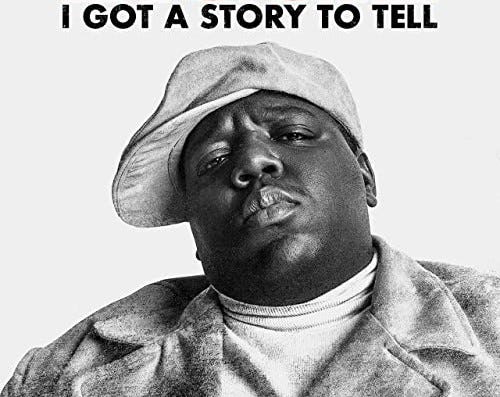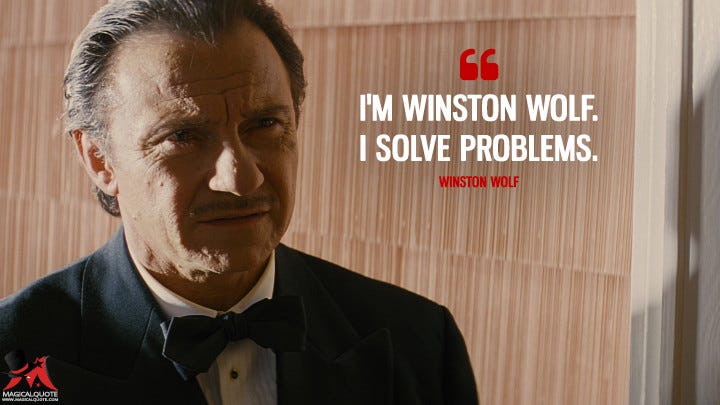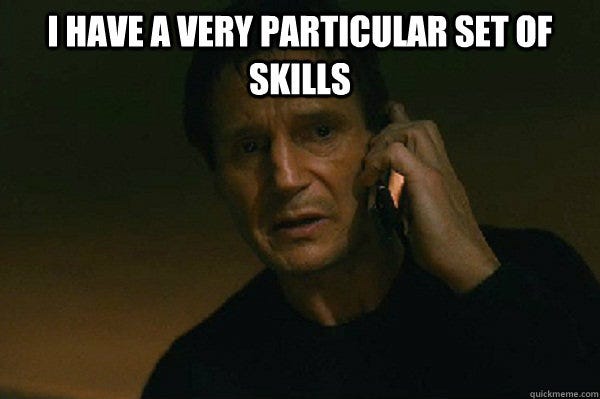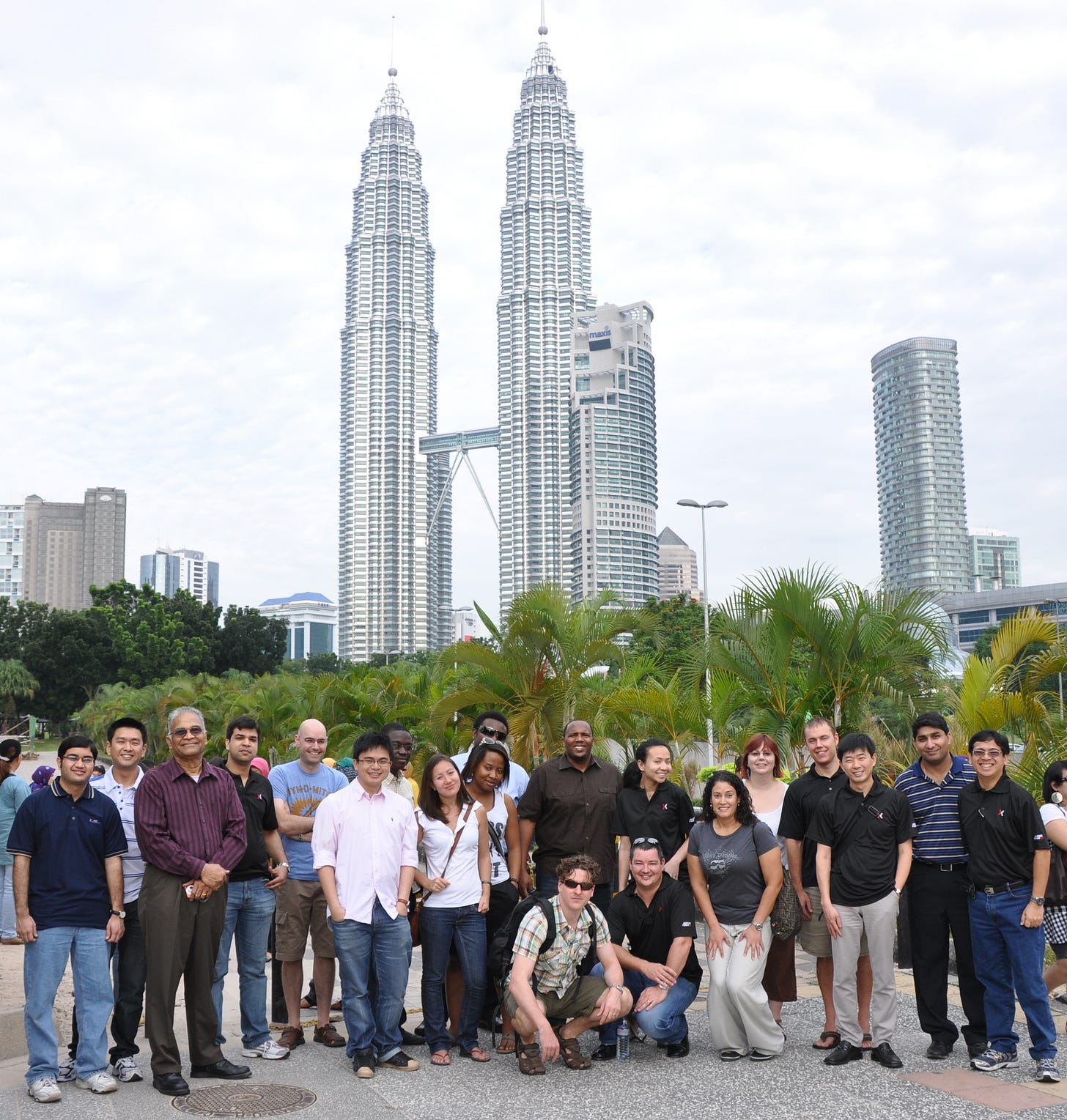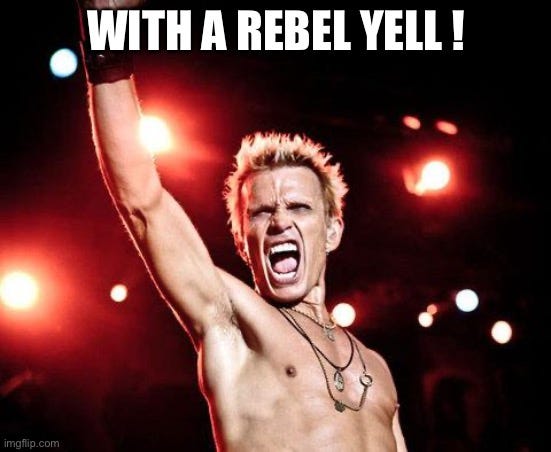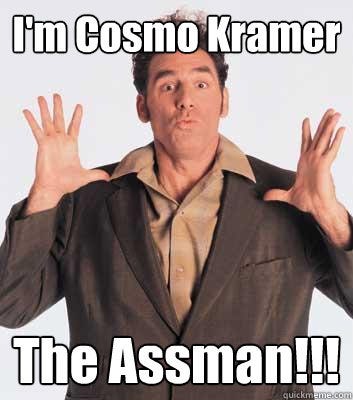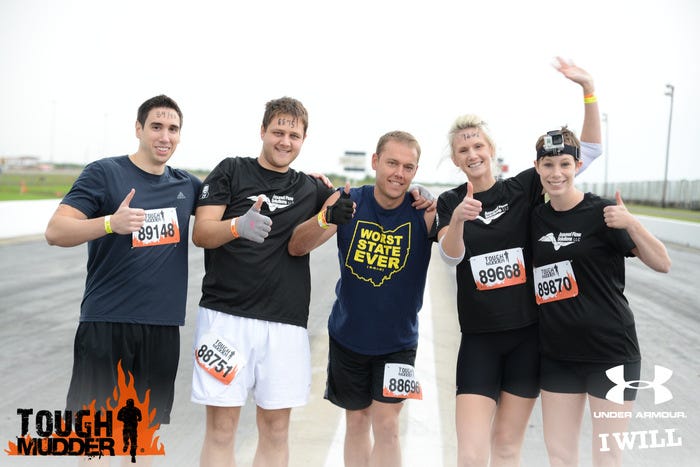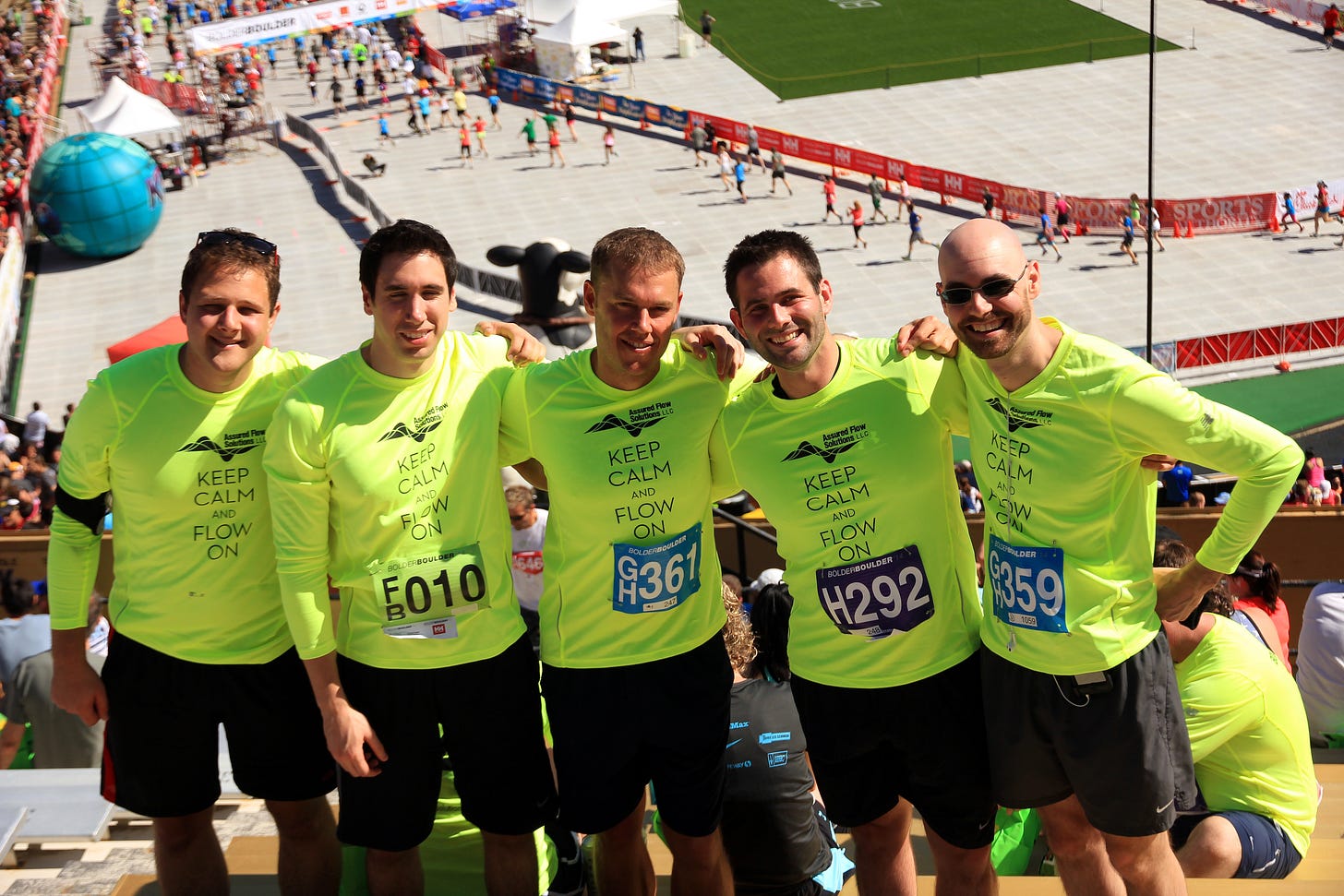Career Path: Good, Bad, Ugly...and What's Next
From 'Winston Wolf' to 'The Wolf'
TL;DR: I’ve tried all the career options, but I keep coming back to the freedom and excitement that we are creating with Pontem. LFG!
Disclosure: I hate social media. Period. End of story.
Now that I have that out of the way…Pontem’s co-founder Andrew Yule (who also hates social media…which is odd for someone so much younger than a Gen-X’er like me) convinced me to take to Substack to tell the story of my career path, from graduation until now. We thought it would be helpful to give an honest account of how we got where we are today. Since I will be lecturing at my alma mater (University of Michigan) later this fall and one of the topics is always about career options, it made sense. Plus, given that I am starting Chapter Five of my career (‘The Next Episode’), now is a good time to reflect. To summarize. To Pitch. So, with that… ‘I got a story to tell’ which may either inspire someone just starting out or capture the attention of those looking for something different in their own next chapter.
Chapter One: Picking a College / Major
When I was growing up, if you were good at math and science, high school guidance counselors suggested engineering. This was in the dark ages (pre-internet) so most of the career advice was very linear. You had your main go-to options and generally got slotted into one, based on your aptitudes (or what your parents did…neither of my parents were engineers). I didn’t have any real passions that could guide a career choice, but I enjoyed solving problems. And a played a lot of Tetris. For whatever reason, I could always “see” the solution to different types of problems very easily, even if I couldn’t figure out all the specifics. I could convince people to pitch in and help, under my direction, to solve the problem quickly…even if it was frustrating that the answer was so clearly obvious (to me, anyways). But, I liked having that power/control to find the solution. A nerdy Winston Wolf…which also came in handy as the oldest sibling and having to cover-up a lot of messes at home (sometimes blood, sometimes holes-in-walls)
I picked Michigan because (a) it wasn’t University of Texas or Texas A&M, so I would have a different story to tell from my friends and (b) they had the Fab Five basketball team, Tom Brady as an unheralded QB at the time, and cool football helmets. And a pretty solid mix of academic programs. It was honestly that breadth of options that sealed the deal at Michigan. I didn’t know if I really wanted to do engineering, so I had fallbacks of medicine, law, or other options. That was actually my plan - do chemical engineering as a “fallback” and then go to either law school or med school. So, picking a school with a lot of lateral opportunities was a conscious decision.
While at Michigan, I ended up working for the late Prof. Scott Fogler. If you took Reaction Kinetics in the last 25 years, it is very likely that you have come across Dr. Fogler’s work. Later career, I actually came back to Michigan to help fund his joint-industry research in paraffin-related issues and hire many of his PhD students. Go Blue.
I had ZERO interest in business or anything entrepreneurial. My engineer roommates and I would make fun of our business school friend for his “simple math classes" (Dude, where are all of your partial differential equations?). And starting a business? Not creative enough to have a brilliant idea. Plus, being the introverted engineer personality, that would probably mean I had to go talk to people. In person (remember, pre-Internet). Nope. So, Chemical Engineering graduate with options to continue school or get back home (Texas) and make some money. I wasn’t too thrilled about the idea of more engineering classes, so home it was.
Chapter Two: Desk Job: 1997 - 2000
My first real job (with the same company as my summer internship while at Michigan) was sealed with an interview while on Spring Break down in South Padre, TX. In those days, it was very common to have your internship lead directly to your permanent job. Kids jockeyed for positions almost immediately once they got into school (you got an internship lined up yet? huh? do you?), so they could line up what they would do after graduation. And then forever after that. Very linear.
After interning for the past two summers at an engineering & design company in the petrochemical / refining / fluidized catalytic cracking space, I was pretty confident I would get a permanent offer. But, I needed to drive back to Houston for the final interview, cutting short my last college Spring Break. I was…um…”hydrating” for the better part of the day before, so when I saw the red flashing light on the hotel phone (they company called my mom…who called the hotel to leave me a message…yes, I told you, I am old), I sobered up pretty quickly, gathered up the remaining brain cells, and drove back to Houston.
I had my interview with my new boss…who actually happened to be my Little League baseball coach. Life lesson: you never know where opportunities will come from. Now, I look at the kids I have coached for the last 10+ years and see they are already better at programming than I was (What, VBA isn’t the default programming language anymore??). Maybe I will pay it forward and hire one of them soon?
Took the job. It was safe and convenient, but also technically challenging. My role was in process simulation and my particular set of skills was to set up a brand-new automation workflow that pull data from numerical simulations into equipment data sheets. At this point (late 90’s), this was all still done by hand!! I figured out a way - working with the simulation software providers to disclose their source code - to automate this and create “Electronic Data Sheets”. It was as close as linking engineering and data (at that time) that I could get. Automating out the mundane and quickly pulling in/viewing information. By today’s standards, it would be commonplace. But, at the time, it was easily 10X efficiency improvement. So, I became the “data sheet guy”.
That was my lane. I was never allowed to run the actual process simulation models, which is bizarre considering we have our new hires doing this on Day 1. There was a progression. A very well-defined, prescriptive progression.
Reflecting back, I worked for a great group of people who were very nice and built real stuff - refineries across the US (which there haven’t been a lot of new ones recently) and abroad. I did what I was asked and let the “grown-ups” do the hard stuff. That was their role and I had mine. Plus, I was young and valued my free time. We worked 4-10’s (7:00am - 5:45pm, Mon-Thurs…every Friday off) and I was a clock-puncher. I worked my 10.000 hours and no more. I was super efficient and always over-achieved from a deadline standpoint, so I wasn’t about to ask for more work (or work more hours for the same pay). Once the clock hit 5:45pm, I was gone. And, I got pretty good at golf because I played every Friday (sometimes twice) and was training/fighting quite a bit, a mix of martial arts and ‘Fight Club’, which just came out around that time. Work was clearly my 2nd priority.
Some of my apathy was just being young/dumb, but some of it was the company set-up. There wasn’t any incentive for over-achieving. Promotions and roles / responsibility were experienced-based and generally uninspiring (Oh goodie, I can move from Engineering II to Engineer III in 2.5 years!). Not to mention telling people you are an “Engineer III” is a real conversation starter. I still see this today with the Senior / Staff / Lead titles. I understand it is necessary for salary grades and other admin/HR-related issues, but is it inspiring? Not for me.
I worked in a live-action version of Office Space, where bragging rights were based on the size of your cubicle or - if you are lucky - you had doors to a real office. Under the fluorescent lights, I felt trapped and had no drive / motivation. If only I could grind it out for another 40 years (and avoid any layoffs), I would be set. After 2.5 years, I was ready for something else.
Interlude: Quarterlife Crisis (2000)
My Quarterlife Crisis set in (I can’t do this anymore!!), so I quit without a real plan. I took the summer off, played for (what we told girls) was a “semi-pro” baseball team, kept fighting, and had a plan to get my MBA. I got nearly a perfect score on my GMAT, had excellent performance reviews and letters of recommendation, and had worked on some interesting projects. I applied to Harvard, Stanford, Kellogg, and Wharton. Who wouldn’t want me? Well, apparently nobody. I was rejected from every B-School I applied to. Maybe I should have been less of a clock-puncher and networked more…
In retrospect, the rejection was the BEST thing that could have happened to me. As it turned out, this was the summer of 2000…the first big MBA rush of mid-career professionals. The shear volume of newly-minted MBA’s soon to be hitting the job market - after taking 2 years off and pouring money into their education - was going to put a lot of pressure on them, financially and professionally, as they fought for a finite number of career opportunities with their new degrees. It was brutal for many MBA’s that I knew. I suspect a lot of them thought that just putting MBA behind their name would be a golden ticket. This is not to knock MBA programs - far from it - they definitely have their place. But, for whatever reason, it wasn’t meant to be at that stage of my career to get my MBA education.
Without a job, a trust fund, an invite to Astros Spring Training, or an MBA, I needed to get back to work. So, I posted my resume to Monster.com.
Without an opportunity, their abilities would have been wasted, and without their abilities, the opportunity would have arisen in vain (Machiavelli, The Prince)
Chapter Three (A): Private Co: 2000 - 2004
I really had no idea what to expect going into my next job. I had some petrochemical work experience and knew what I DID NOT want…but still had no clue of what I DID want. I think my resume got one hit on Monster. I showed up to the interview with no expectations and no real plan.
The company was “interesting”. Founded by 4 ChemE PhD’s who spun out of a major oilfield E&P, they had a small laboratory, solid engineering fundamentals, and some intellectual property (virtual / remote operation for offshore oilfields, which back in 2000 was extremely cutting-edge…maybe they were on to something with these “digital twins” 25 years ago…). Spun out of Ponca City (OK), they had set up shop in a small strip center in West Houston’s Energy Corridor. In fact, it was so non-descript, I couldn’t find the front door and nearly drove home and blew off the interview. It wasn’t hidden in a trendy, speakeasy kinda way…it was just the available space they found and non-pretentious. It was a startup. The company was less than 10 people and I think most of them were wearing T-shirts/shorts the first time I met them.
They were looking for new graduates and young engineers, those willing to jump in and solve problems. They were in a very new space (“Flow Assurance”), which was evolving with the emergence of the deepwater (offshore) oil/gas development. This meant a lot of learning, but a lot of freedom to build out what that discipline and the business case(s) should look like.
Ultimately, I took the job based on one Question & Answer from their entrepreneur CEO that still sticks with me to this day. Something I try to use with my co-workers/staff when we talk careers:
CEO: Why did you leave your last job?
Tommy: I quit because I wanted to get my MBA, but I didn’t get into the schools I wanted. Plus, it was getting boring and I could see pretty much exactly what I would be doing 5 years from now.
CEO: That’s ok. You can learn all of your MBA stuff here “on the job”. And we will not be boring. If you find something that you want to do - and it makes business sense - we will pursue it.
The opportunity to do “MBA-type things” in a real-world setting - with real data and real problems (vs curated case studies) - was something I couldn’t pass up. And get paid while doing it! The learning curve was extremely steep, but I think anyone who is goal-oriented and driven will tell you that is what they want. Just throw things at me. And, if you have to, fail quickly…but don’t fail too often!
We were growing and needed people. So, we hit the college recruiting circuit.
Within a year, I was able to convince them to hire my younger brother. Other than telling people that we have “TWO Golczynski’s” working in the company, it was a great / fun experience. We got to work together, travel together, and fight like siblings in meetings (which we did often). But, the biggest lesson learned was really around how this company attempted to hire candidates. At the time, they worked through a recruiter to source resumes, screen candidates, and bring them down for interviews. And only considered a small handful of schools. The screening criteria was very strict, based on minimum GPA standards.
My brother didn’t initially pass the min GPA test (I think it was 3.5), nor the school test. He was 3+ GPA….but also (a) double-major in computer science / mathematics and (b) college baseball player. Why we are basing criteria on only GPA, when the appetite for learning, ability to prioritize, being a team player,, competitive, goal-oriented, etc., aren’t even considered?? After some convincing, the company to take a look, the CEO “got it” and brought him in…and ultimately eliminated those hard-coded GPA standards. How did it turn out? Well, he is still with them today (20+ years in) and a Vice President…
PS - there IS a 3rd Golczynski engineer brother, who is probably the smartest of us all (ChemE, oilfield, gas-to-liquids patent holder, etc.). The youngest of the family, he currently works for my first company and inherited some of my Electronic Data Sheet projects as his first job. Small world indeed!
Back to the interviewing criteria, the dislocation between what businesses think they want (what they look for) vs. what businesses need (if they can identify those skill sets) is a huge issue. This can also get more difficult in larger companies with more defined processes. The struggle to search out and identify talent - particularly if you are in a specialist field - will make or break a business. This whole process was very influential and shaped how I have tried to build teams throughout my career.
On The Road Again…
During these first five years (2000 - 2004), I traveled. A lot. I was young, single and said “yes” to everything. Especially after my first job, where I barely left the office, the doors were wide-open now. I spent most of my time going overseas, which was challenging as this was also the period around 9/11, so the world changed a lot (plus, no more bringing home bottles of whiskey in my carry-on bags). I had always hated flying - I still do - and this didn’t help the anxiety. But, the experience of working in different cities with different cultures shaped my world view to this day.
This is still relevant - in a post-COVID world - where the most effective hybrid, return-to-work policies are being debated. Particularly when building a multicultural team in different locations, the face-to-face meetings and relationship-building is something you can’t get over Zoom/Teams. It has been worth the added time/cost for a relationship-driven business to go to site. You simply catch more of the nuance and subtleties being there. And at the water cooler / coffee pot in between the actual meetings. Plus, no matter how many times you have visit a place as a tourist, you don’t really know it until you work there (although, I did take the time to play tourist after-hours). I would encourage anyone to take the extra day(s) to explore. Who knows - my brother met his wife while working in Seoul, South Korea.
For someone in the oil patch, I was extremely lucky with most of my travel. For every site visit (Macae, Puerto La Cruz, or Pasadena), there was a Rio, Sydney, or Cape Town close enough by to go visit. And I did.
And, I was still fighting too and got to train in other styles while overseas. Amazing. I was an ‘ok’ fighter - won some, lost some. My face lost the most - I think I am at 37 stitches in various places (+ 2 broken noses). Definitely have a “face for radio”. After one rough weekend of deciding to block an elbow with my eye - not smart - I had a Monday morning meeting with a major operator on one of their Gulf of Mexico assets, freshly stitched up. I think I scared the operator, but it turned into a great talking point and built a reputation from that, good or bad. The ironic thing is I am still working on that project to this day, 20+ years later.
Chapter Three (B): Public Co: 2004 - 2012
There are a ton of books (and now podcasts) about how to grow/scale a small company. I watched first-hand the growing pains and challenges that we had as we expanded. Success for a small business is a strange animal because you either (a) crave more of it or (b) withdraw and protect your gains. We were growing…and doing great for a small company…but so were others in our space. And at a faster rate because they were bigger (or funded), which meant they could easily cannibalize us in the future. Plus, one huge dilemma is the team you bring in to grow from 1 to 10 people is likely not the same to go from 10 to 100….or 100 to 1000. So, did we have the right team to scale?
Also, having an ownership team (4 x PhD’s) expected to align on strategic financial decisions (i.e. how fast do we want to grow, where do we get growth capital from, and what is our risk tolerance?) was a huge challenge. We had built a nice company (a “cute company”), but there was a need to decide what we wanted to be when we grew up. Both for the longevity of the company, as well as afford the employees career opportunities for those who wanted more.
In 2004, the decision was made to sell to a much larger, public, international-HQ’ed company. We fit into a very specific niche that they lacked, so the fit (on paper) was perfect. There wasn’t access to “growth capital”, per-say, but there was access to resources. In-country resources for global expansion, back-office resources to allow us to focus on growth, and contractual resources to make project awards easier. And it worked (on paper).
Over the next 10 years, I led a team that spun up offices all over the world. 2+ million miles flown, 40+ countries, 6 continents (actually visited all 6 in a single year), multicultural teams that we made a point to connect through knowledge-sharing initiatives, etc.
In my time there, we never missed a quarterly financial performance metric (35 quarters of meeting/exceeding our KPIs). Some of that was purely due to the team’s performance and some of that was setting the right KPIs (you may call it ‘sandbagging’, I prefer to call it ‘managing expectations’). Either way, we communicated clearly with our team and they always delivered.
In those days, video conferencing wasn’t really a thing. So, we would gather in-person to meet, bond, share, play and build what turned out to be a global leader in our space (and remains that way to this day). The momentum we captured in the time leading up to our events…as well as the honeymoon period after…carried us through most of the year. It was truly a world-class team. How could I ever leave - do you know how difficult it would be to compete against a monster you had a part in creating?
The people that we brought in have gone on to amazing careers, spread now across the globe and into different industries. CEOs/Founders, VPs, etc. Seeing that has clearly been the most rewarding part of my career.
Full credit to these initiatives goes to others - very few of the great ideas we had were mine. In fact, probably none of the really creative ideas were. My role was to say “yes” a lot and manage up (to keep “you know what” from rolling downhill). We had a culture of starting with “yes” unless someone had a reason to kill the idea…rather than starting with “no” and trying to argue the value proposition to the 2nd decimal point. Hire good people and get out of their way.
We even managed to produce the best ‘Dad Joke’ company newsletter of all-time (again, not my idea). If you are in the Flow Assurance space and you don’t laugh at our newsletter being called the “Cooldown Times”, then we can’t be friends.
As much as we (the legacy ‘small, cute company’ staff) would like to take credit for the growth, we really did leverage the resources of the large, parent company to accelerate our growth. I don’t think we could ever have done it on our own and definitely not in the same time frame. Their existing infrastructure made the in-country entries much easier. BUT….that comes at a cost (literally). Working for a publicly-traded company meant managing shareholder expectations for growth. Working for a company with diverse offerings (and different operating margins) meant a ‘one-size'-fits-all’ approach doesn’t work when it comes to spending. And those started to put us in an “either/or” mindset when it came to spending decisions.
We were the outlier culture within the organization - rebellious with our young, driven cohort of workers. We became questioned more frequently on ways to be more “efficient” (i.e. cheaper), in-part to help the wider organization and in-part because it looked bad that we were flying all over the world (even while hitting our KPIs). For those global initiatives where we brought team members together, what was the “value” of those engagements? Was it critical - could we prove it was necessary to spend the time/money? We knew they were valuable, but when asked to put a number on them, we struggled.
It felt like we were being treated like children, getting the “Because I said so” response from the parent company on why we needed to exhibit more capital discipline. Maybe they did know best, but we struggled to accept this (even though, on some level, we were benefiting from the support). Culture vs. Capital.
Maybe this is where having an MBA would have helped? Or maybe this is just the scalability issues that everyone comes up against (again, maybe this was taught in the MBA program)? Either way, the conversations grew more contentious and the culture that we built was changing. Whether it needed to change (evolve?), whether we could have messaged it better to staff/management, or whether we could have been left alone to do our own thing…all of that is hard to say. But, it was apparent that the larger company dynamic wasn’t feeling right for some of us. Especially me. We had never failed to meet our financial metrics, so we wanted to be left alone. But, in hindsight, with the safety net of the larger company to bail us out (if needed). Probably not a fair expectation
Trust the Process (Sam Hinke, Philadelphia 76’ers)
For my own sanity, I landed on the following analogy, taken from one of our team building events in Las Vegas: Winning at the $5/hand blackjack table (small company) and winning at the $100/hand blackjack table (big company) look very different. It’s easy to become protective of your winnings and get conservative if you are a $5 player…whilst the $100 player looks at you and says you haven’t done anything yet. It’s often a different “type” of player at each table - not right or wrong, just different - and perhaps that is the same in business unless you are willing to adapt. The biggest challenge for myself was knowing it was probably time to move to the $100/hand table…but I still really enjoyed the thrill of those $5/hand tables and trying to take down the casino (‘Rainman’-style), where winning felt more “personal”.
Plus, if you just keep doubling your bets after every loss, mathematically you eventually come out on top (assuming you don’t hit table limit max). So, we thought we would always end up winning. Trust the process.
I was personally torn - corporate route vs. entrepreneur route? I really liked the small business idea, but in 2008 I got a chance to make it to the financial promised land: Wall Street. I accompanied SM Energy (then, St Mary Land & Exploration) as they rang the closing bell on the NYSE for their 100 year anniversary. The buzz and energy around that was amazing. But, I wanted to be the one to ring the bell next time and I didn’t have the patience to wait it out, not to mention all of the corporate reporting and fiduciary responsibility that stood between me and that. I liked the building.
So, not feeling like I was ready for the full-on corporate/boardroom experience, staring at more days/nights of being on the road, and really missing the thrill of building something from the ground-up with no shackles…..I left. Again. And this time, unlike the Quarterlife Crisis, the stakes were higher. Aside from walking away from a corporate job, I was about to be a single parent with two little boys (both under 3) to look after. So, if your life is in complete chaos, might as well as nuke the whole thing, right?
And this was walking away from a lot: good salary, long-term incentives (stock options), job stability, and great friends. But, it was feeling predictable and restrictive. And, it really felt like “work” for the first time. I knew we could succeed if we just followed a prescriptive formula. It would be a solid B grade. But, what fun is that?? Let’s shoot for the A+.
Chapter Four: Company Formally Known as AssFlow: 2012 - 2022
Before leaving, I had been noodling on a very specific idea for a couple years. There were a lot of specialist companies (which are too small/niche) and a lot of generalist companies (which lacked mobility). Is there a way to thread the needle, bring a high-level of intellectual horsepower into a company that can utilize it, without homogenizing it? Or, better yet, is there a way to bring two separate - but related - specialties together, offering a combined solution by “bridging” the gap between them to provide value to end-users, creating a 1+1=3 equation for the end-client?
I sat through too many meetings noticing this very obvious (to me) gap in the market place. And, ironically, I kept seeing the same guy in the office lobby (we were working for different companies) and we would have the SAME conversation and notice the SAME gap. So…hey man…want to start a company together? Ok, yeah, let’s go with that. (Ok, there was a little more strategy involved, but that’s how it began).
Starting a company is hard. Starting a company by yourself is even harder. Starting a company while bootstrapping as a ‘later-career’ individual, with real-world (grown-up) financial responsibilities is extremely hard. But apparently, naming a company that doesn’t get shortened to AssFlow may be the hardest! Yes, we started a company (Assured Flow Solutions) and didn’t foresee the abbreviated name coming. We tried to be very literal about the market we were serving and…well…you get AssFlow. Feeling a bit like Seinfeld. But, regardless, we were off and running. And we had complete control of our destiny.
We grew again in familiar territory (energy industry), navigated a non-compete, and went head-to-head with my former employer on projects in many cases. And we did it with a lot of familiar faces. I consider it a testament to how we treated people that I had the opportunity to hire many ex-colleagues into the new venture. A good number of my former (and current) colleagues are multiple-time hires. In fact, I have worked with my current partner Andrew at our last THREE (3) jobs. Either he is really lazy and just follows me around…I am really lazy and just hit him up with the “Are you Up?” text when I need someone….or we have found a great symbiotic relationship. Let’s go with that one.
The ways we recruited were fun and unorthodox. Chipotle interviews, Tough Mudder races, and even drunken business plans drawn out on cocktail napkins in a Bali bar (which launched our international office). And we hired siblings (paying it forward from the days of 2 Golczynski’s…but this time, we managed to find siblings with last names longer than mine! Randomly, I have worked with 3 sets of brothers and Golczynski is the shortest of all the surnames).
Our first university lunch-n-learn was given at Memorial University (Newfoundland). 5 people showed up. That is like 1 pizza per person. We were just starting out and we were looking for ONE (1) intern. Two friends both came up and inquired about the job. At this point, it was nice to have anyone interested, let alone TWO people! They were both perfect…so why chose? We ultimately hired them both (two on the right in picture above) and went on to bring in 2 interns/terms for the next few years after that.
When you have a shared vision and can communicate that clearly, the teamwork flows easily. For a small company, the ability to do that quickly and seamlessly was paramount to run quickly. It’s the equivalent of a ‘no-look pass’ or the ‘raised eyebrow’ that tells your team what to do.
We worked on world-class projects - pushing the limits of technology in our space. We far exceeded what a company our size should be able to do. As an example, we were on-site for the start-up of the world’s longest deepwater, subsea tieback (150+ km to shore, offshore Israel) just over a year into the company’s existence. Check out the Al Jazeera story below (1:37 mark you will see a “young” Tommy)
World-Record Long Distance Subsea Tieback
We were working on domestic and international projects, small and large operators, onshore and offshore…with a huge diversity of technical challenges to solve. We can a great mix of ‘practical’ PhDs and inquisitive engineers. Again, a testament to the relationships we had built throughout our careers, which followed us to the new company. We harnessed the power of personal brand/reputation, proving that if you are good enough at your job, you can still name your company AssFlow and be successful.
We repeated the successes of the knowledge sharing events, this time making them open to the public. A precursor to many industry events now that are a mix of technical knowledge and entertainment. These did not exist back in 2014 - the options to hear speakers were largely hotel ballrooms with bad food options. We saw the market need for something more ‘youthful’ and energetic, holding events that people wanted to attend.
We continued to build the team through reinforcing a growth-minded culture. All 100% self-funded and bootstrapped. Others talk about “Net Zero” from a climate initiative, our growth strategy was also based on “Net Zero”. We wanted to pay people a fair salary, train/develop them, explore new opportunities, make work enjoyable, invest in our growing culture…and have zero money at the end of the day that was not purposely spent in growth mode. We didn’t want to lose money, but we realized we couldn’t “save our way to prosperity”. Shifting our budgeting process from the publicly-traded, shareholder value mindset to one that prioritized “fiscally-responsible growth”, we lived within our means…but just barely. And it worked. We ran faster than larger teams could, but we were also able to do more than other peer (smaller) companies because we stayed aggressive.
Being a small / private company, we made some unique decisions for marketing spend that clearly out-paced our competitors. We sponsored charity events for NFL stars (JJ Watt), minor league baseball teams (Sugar Land Skeeters, now the Astros-affiliate Space Cowboys), every employee whose child played sports had the option to get their team sponsored, etc. Did it make financial sense for that specific expenditure - probably not. Did it help establish a culture/brand, both internally and externally - absolutely.
Within all of this, the one area we did focus on relentlessly was cash flow. Our Profit/Loss (P&L) statements were great, but we were diligent on our AP/AR. Being a small company, you have a risk of being at the end of the line in terms of getting paid. We completely under-estimated the initial cash reserve requirements when we started out with initial receivables. But, we learned and that stabilized over time. We brought in a trusted accountant (an amazing, detail-oriented colleague from my previous company…go figure!) and worked as a partner with our clients. In our nearly 10 years of existence, we only had one bad collection. For a company operating in 6 continents without much leverage - other than simple intellectual know-how - that was outstanding.
To Fund or Not to Fund
When we looked to expand in 2015 with a new laboratory, it was a multi-million dollar initiative that we obviously couldn’t fund out of free cash flow. After considering various options, we funded the lab through a traditional SBA loan. We were too young/small to get more institutional investment and we didn’t (at the time) have anything of interest to the Venture Capital / Private Equity (VC/PE) firms. And, we were arrogant enough to want to maintain 100% control. So, the SBA option was a perfect fit. But, nothing comes for free…
When the SBA asks for collateral in an engineering/man-hour business…well, that’s you. We had no tangible assets other than our brains. So, what was left to give: personal guarantees. That’s any non-critical assets as collateral. That’s your savings accounts. That’s your business partner’s mother’s house. That’s the Sword of Damocles hanging over your head until the loan is paid back. That’s real stress. Our SBA loan closed in 2015…right when oil prices tanked. I believe we had one of the last SBA-approved loans for the oilfield. Because, well, why would anyone loan to the oilfield at that time, right as we signed our lives away!?
We ultimately survived. Party time! Good times were had by all. We started paying down principle on the loan, all while opening up foreign offices in London and Perth. And then, 2020 came…
And then, COVID
We were growing without an exit strategy. We were not preparing to sell, so we didn’t need anything at that time. We were not in margin-preservation mode, although we always kept a very keen eye on the bank accounts (again, cash was king). We were focused on growth and being financially prudent, so why bother preparing for a Black Swan event? Well, COVID obviously knocked everyone for a loop and we were no different.
The Secret to this job is Personal Relationships - Jerry Maguire
At times like these, you quickly face what every entrepreneur (I guess that is what I am at this point) faces - how to keep everyone fed, during good times but also lean times. Those who took chances on you. Your vision. How you treat people during the tough times truly defines the culture created. Proud to say that we managed our way through COVID without any downsizing - no reductions in staff, salary, benefits. Nothing. We prioritized employees first, and they reciprocated in being flexible to the “new normal”. A lot of this was due to how we messaged to staff - we always asked “On a scale of 1-10, how honest do you want us to be?”. Shockingly, we rarely got “10”. We were open/transparent throughout the process. We used words like “liquidity” for the first time. Plus, we had recruited and brought in a team that we built a report with. It was personal, which made it very hard to have these honest conversations…yet very easy at the same time. Because, we could “just talk”, without agenda. And I think that really helped us uniquely navigate the challenges of COVID, during and after, in a hybrid working world.. This absolutely translated into a financial situation that stabilized faster than most of our peers. In fact, in nearly 20 years of management, I have never had a financially-induced downsizing.
But COVID shook the foundation of what we had built…and could we withstand another blow? And could the ownership withstand another scare? Add to this the growing backlash against oil/gas (the ESG militia) and we had a serious forward-looking crisis. Lastly, we had reached that awkward ‘adolescent’ stage of the company’s growth: we were growing up and had staff that wanted to stretch their legs into bigger/better things…but we weren’t quite there yet. So, how do you offer opportunity to employees - the lifeblood of your organization - without growing? Without taking on MORE risk?
Personally, I would have retired with ‘AssFlow’ (but maybe changed the name as part of a rebrand). I liked what we had built. I liked the team. I liked the freedom. I liked the grind. But, its not for everyone. We made the very (very, very, very) difficult decision to exit, selling to a partner who could take the company to the proverbial “next level”. And, we believed they could.
With best endeavors, we exited to a Private Equity (PE)-backed company. They were looking for exposure to (a) higher-end laboratory, (b) digital opportunities, and (c) international growth. Check. Check. Check. We agreed to stay on and help with the transition, honestly believing we had running room within the larger organization. Similar to what I had seen before, they could offer us back-office support and ease-of-entry into new geo-markets.
Ultimately - as is the game in Private Equity - nothing is forever. And in our case, “forever” is 6 months. The PE-ownership changed hands fairly quickly, with new strategic goals which were less focused on the above. Not right or wrong - ultimately, probably right for their organization - but obviously a huge impact to how we were to proceed. Much like relationships, timing is critical…and timing here was not on our side. We had built a very culture-driven organization, which was negatively impacted by uncertainty and change, in general. We had always been able to deliver “bad news” to our staff (heck, I have given the “we may be going broke” speech multiple times), but this was different. It wasn’t coming from us anymore, only through us.
Beach Interlude (Cabo, Mexico - New Year’s 2023)
After working through my obligations with the transition - working as diligently as possible to continue the business, relationships, and staff morale - I was drained. This isn’t meant to be mental health piece (I am from the generation and family lineage of “Just suck it up”), but the toll of the 3 years of COVID-survival and a company sale / transition was evident. I had always spent a lot of time pushing friends to “pursue their dreams” and “if you don’t like it move on” and “if you have this great idea, why aren’t you chasing it / what are you waiting for?” Easier said than done, I suppose.
So, sitting on a beach in Cabo at the end of 2022…something “clicked”. Not sure if it was the salt air, the fishing, the hours spent ‘rabbit holing’ the origins of the Russian oligarch yachts offshore, or the mezcal (oh, the mezcal), or something else…but that spark returned. The desire to go do something else - to build something again - returned. What exactly - no clue - which was terrifying…but exciting at the prospect of a completely blank sheet of paper potentially. Oh, and with all of that, a smile finally returned. Good trip. Excellent trip.
Plus, with kids in school for the next 7 years (maybe more, if Mason follows through on his threat to “live and home and become a chef”…kid cooks 3 bowls of Ramen and he is a gourmet all of a sudden), I’ve got plenty of running room and a passion to go build something again that I can commit to.
And, I wanted to be excited to tell people what I did. It’s hard to do that with engineering sometimes. Much like the “semi-pro baseball” example earlier, I used to lead with “I teach kung-fu to kids” (vs. “I am a chemical engineer”). The kung-fu line always killed….poor engineers…
If I was going to do something else, I DID NOT want to start Assured Flow 2.0. In looking at a new adventure, that was my #1 demand. I wanted more. After that, I came back to four (4) fundamental things, helped by the mezcal for clarity of thought, of course…
I still liked to solve hard problems. The Winston Wolf was alive-and-well. And, I liked doing that with other like-minded people (did you know that Andrew is a semi-famous Rubik’s Cube solver??). And I am definitely happy to be the dumbest one in the room. I have had the opportunity to work with so many brilliant minds, that I knew I wanted to get back to that vibe. There are lots of problems to be solved - energy space and beyond - but definitely not shying away from energy. There is still plenty of work to be done, solving challenges and defending the industry that has given me so much. But, those skills that we learned will ‘travel’ across industries too. And now, with the whole idea of leveraging data to solve those problems, the world started to open up. The opportunity to think more laterally was really appealing, similar to why I chose Michigan for undergrad years ago.
I have seen a lot. Between diversity in projects, people, and processes. Small vs. big companies, private vs. public, bootstrapped vs. funded, domestic vs. international, physics-led vs. data-led. You name it, we have probably seen it. So, from a next phase perspective, being able to leverage that experience - and mentor others - would definitely get me out of bed every morning.
I have screwed up a lot. Probably made every mistake you can make when it comes to technical, personnel, financial, personal, marketing, strategy - I have gotten pretty good at knowing when I am doing something stupid. But, that’s ok. Its going to happen again, I am sure. I tell the kids on the travel baseball teams I coach: “It’s ok to make mistakes, but can we please suck at something new today?”. Learn and move on. It’s time to suck at something new.
Personally, I don’t need anything this time around. Don’t need legacy or to build my CV, don’t need to exit another company (I already have one “in the box”, which also included a 2nd “bite at the apple”, as those in the PE space say), not looking to raise capital, don’t need to grow a social media following, and not looking to specifically build the next wunderkind-app. If any of that happens organically, we will embrace it. But, it isn’t our guiding North Star. We just want to do “cool stuff”. With good people. The ability to do this in a free-flowing environment is exciting. As the Brazilian football fans say, “o jogo bonito” (The Beautiful Game).
With the exit from Assured Flow Solutions (and, to be fair, the departure from Wood back in 2012), I have stayed pretty quiet and away from picking fights with the bigger players. Particularly in the niche energy spaces that we built, because I know the great talent that exists within those organizations. But, staying low-profile doesn’t mean being passive or uninterested…(and ok, maybe we did hire some people away and pick some small fights…)
Now all I get is hate mail all day saying Dre fell off
What, 'cause I been in the lab
With a pen and a pad trying to get this damn label off?
I ain't having that - (Dr. Dre, Forgot About Dre)
Chapter Five: Pontem Analytics: 2023 - ???
So, with all of that, we come back to Pontem Analytics. We have talked about Pontem and the space(s) we play in over the last month, but have been grinding away since the beginning of the year, once the Mexican mezcal haze wore off in January. There is plenty to read about, with some very exciting and very diverse opportunities that we will chase. And we will be successful in each. Because - at their core - they all relate to something we are extremely passionate about: solving difficult problems. And we think that is a message that people can rally behind.
Andrew and I have spent a lot of time crafting the mission, vision, values for Pontem to align with the company that we would want to work for. Learning from the missteps we have seen in previous jobs, combined with our belief in what can be accomplished with a great team. Being at the cutting-edge of leveraging data to make better decisions. We have been quiet - purposely - while laying the foundation for success. Running it back, with more freedom and more purpose…and yes, a new chip on the shoulder to prove we can do it (yet again).
We will continue the idea of investing in our people, putting our resources into their growth / development, which will ultimately translate to Pontem’s success. Investing in people, new initiatives, new technologies, new ideas, new locations…and even new companies. We are fortunate that the relationships we have built over our careers will help us kickstart things and give us some freedom to explore adjacent spaces. A great middle ground of experience vs. risk-taking.
And being at the nascent stages of a company’s birth is special. It’s chaotic and messy. But, it’s also where you can make the most impact on shaping the future of the company. And, it’s those early-days stories that get remembered. Attacking the day, as Coach Harbaugh says, “With an enthusiasm unknown to mankind”. Go Blue.
So, it’s time to build that team once again. As my friends in Denver say, “Broncos Country…Let’s Ride”. Ok, we can’t REALLY end on that note, I can’t even type it with a straight-face. So, will try this…transitioning from the problem-solving persona ‘Winton Wolf’ to a one that captures a bit more of the competitive nature we will set forth with, ‘The Wolf’.
So who in the hell you think you're playing with now
You done f*cked around and let the wolf out
And I'll be prowling while you sleep
You're playing for fun I'm playing to eat (Whiskey Myers, The Wolf)
Hit us up. It’s Go Time.


